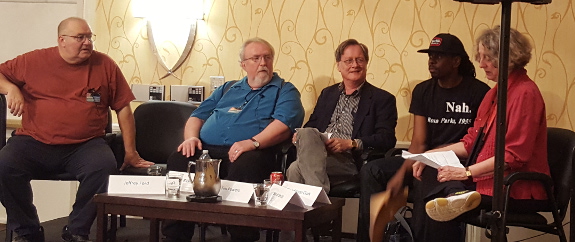Readercon – July 8th, 2016
Thursday: July 7th, 2016
We drove up yesterday (Thursday). We’d planned to leave early but decided to stop at Patient First to check out the splotches that had appeared after clearing brush in the side yard. Result: long delay and poison ivy. Nothing looks, or looked like, poison ivy but there it was. So, prednisone to the rescue and the usual weird side effects. It also meant we didn’t get into the hotel in time for the Thursday night programming — again — even though the GPS saved us from several huge backups along the way so that it ended up only taking 11 1/2 hours.
Friday: July 8th, 2016
Registration opened at 10:00 a.m. and was in an area that allowed lots of free movement. So it took surprisingly little time to get a badge, schedule, map of the programming rooms, and the program book.
Programming started at 11:00 a.m. but unfortunately, we were slow at checking our schedules and figuring out what to attend.

Noon: Using Real Historical People in Fiction.
Panelists: (left to right) Jeffrey Ford, Steve Rasnic Tem, Tim Powers, Phenderson Clark, Sarah Smith (leader).
Description: From Byron to Philby and beyond, Tim Powers’s secret histories use real historical characters to do things they never did, and say things they never said. What is the author’s responsibility in this situation, to the historical figure, to history, and to the character?
NOTES: In no particular order, the panelists talked of:
Don’t letting the research take over the story
Make sure that you don’t do anything out of character or people will be pulled out of the story (and write to you about it). People have expectations of historical people and you have to make sure that you give reasons that mess with those expectation, unless you’re really writing outside the box of what was.
Google books may help you find original source material dealing with the historical figure.
Google Earth can be very helpful in visualizing places that you haven’t been to or can’t remember details about.
Writers are concerned with authenticity; but, if a fact is going to sound/appear/be unbelievable to the reader don’t use it. Tim Powers gave an example of finding usage of the word groovy, in the 1960’s context, in a book from 1910. It’s a fact, but readers will never believe it.
Readers have an expectation of truth when dealing with historical characters so you must lead them along if you’re going to diverge with information that makes your story plausible.

3:00 p.m.: Fantastical Dystopias.
Panelists: (left to right) Sabrina Vourvoulias, Victoria Janssen, Ada Palmer, Andrea Phillips, T.X. Watson.
Description: Dystopia is popular in YA fiction for a variety of reasons, but why do authors frequently base
their future dystopian society on some flimsy ideas, rather than using history to draw parallels between past
atrocities and current human rights violations? Is it easier to work from one extreme idea, such as “love is now
considered a disease” rather than looking at the complexities of, for example, the corruption of the U.S.S.R or
the imperialism of the US? If science fiction uses the future to look at the present, is it more or less effective when using real examples from the past to look at our present through a lens of the future?
NOTES: Discussion was wide ranging covering such ideas as:
Can you only have dystopias in fiction or do they exist in reality?
Whether it is a dystopia or utopia is often in the eye of the reader?
There’s a difference between stories that have a dystopian background but are about other issues and stories that are about the dystopia itself.
Much discussion over whether “Huckleberry Finn” was dystopia on just a story of reality? Does time make the difference?
If some things are better and some things are worse and some haven’t changed, is it utopian, dystopian or neither?
We then spent an hour or so in the books room and what with talking to many of the booksellers, people we knew, and publishers, we only saw half of the tables. Of course, we also bought several books and will have to go back again this weekend to see the rest. This year the aisles are wide and the atmosphere is very conducive to browsing and shopping. Good for the dealers but not for budgeting buyers.
Unfortunately, we’re beat. I’ve got a head start on a migraine and we’re turning in early.




